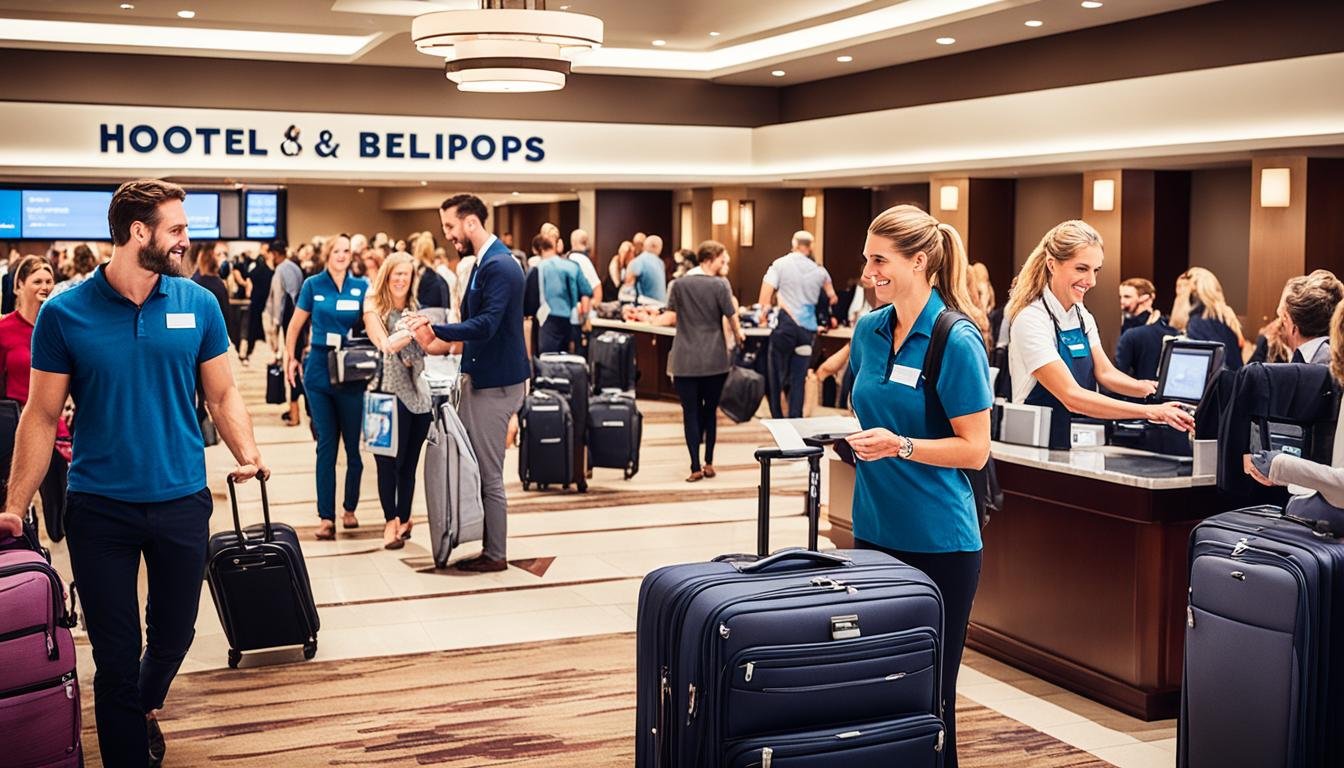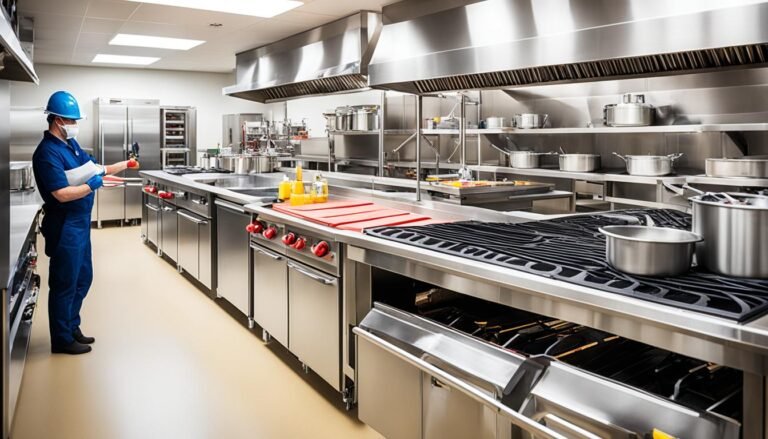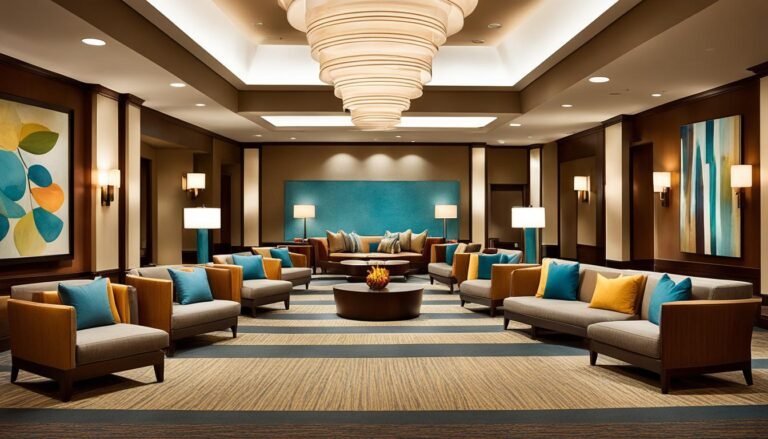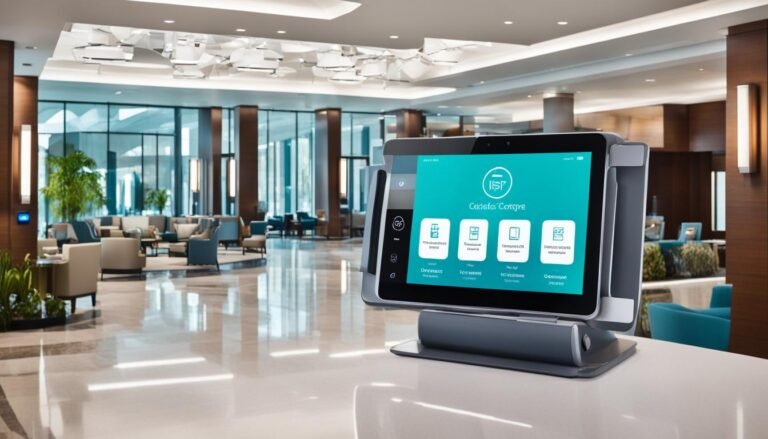Hotel Operations 101: An Essential Guide
Imagine arriving at a hotel after a long day’s journey to a chaotic scene. The lobby is messy, rooms are dirty, and the staff doesn’t seem to care. It quickly dims your excitement for the vacation. This shows how vital good hotel management is for a positive guest experience.
Hotel operations management is essential for a hotel’s success. It ensures everything runs well, from staff schedules to budgets. Without it, a hotel might lose its good name and its guests.
Hotel managers need great leadership and communication skills. They set clear rules, policies, and solve problems fast. Open communication with staff and guests is key.
This guide explores the fundamental aspects of hotel operations. From essential practices to pitfalls to steer clear of, and tips for top-notch management. It’s for anyone in hotel operations, hospitality students, or those curious about the hotel biz. You’ll get valuable insights and knowledge from this guide.
Key Takeaways:
- Hotel operations management is crucial for creating a positive guest experience.
- Effective hotel operations management requires excellent organizational, leadership, problem-solving, and communication skills.
- Clear chains of command, policies and procedures, proactive problem-solving, and open communication are essential for successful hotel operations management.
- This guide will provide valuable information on the basics of hotel operations, best practices, common mistakes to avoid, and tips for successful management.
- By following the insights shared in this guide, you can improve your hotel’s operations and enhance guest satisfaction.
What is Hotel Operations Management?
Hotel operations management ensures a hotel runs smoothly and guests enjoy their stay. The operations manager is at the center, overseeing daily activities, managing staff, and enforcing rules.
They coordinate staff schedules and tasks, putting the right people in the right places. This includes a team from departments like the front desk, housekeeping, food and beverage, and maintenance.
Enforcing hotel policies, from check-in rules to guest conduct, is key. This ensures a great experience for everyone and a safe environment.
The operations manager also teams up with other hotel departments. They might work with housekeeping to keep rooms clean or with dining to offer great meals. Good teamwork makes the hotel better for guests.
Managing the budget is a big job too. The operations manager and GM work on the budget for staffing, supplies, and upkeep. Keeping the finances in check helps the hotel stay profitable.
Training and overseeing staff is vital. The manager hires and trains employees, making sure they can do their jobs well. Ongoing training improves service and helps the hotel succeed.
In short, hotel operations management is about daily hotel tasks, team coordination, rule enforcement, budget management, and staff supervision and training. The manager’s work is crucial for a well-run hotel that guests love.
Core Components of Hotel Operations Management
Hotel operations management is key to running a hotel well and making guests happy. It includes making sure staff works well together, enforcing rules, talking with other parts of the hotel, handling money, and training and leading the team.
The most important job for a hotel operations manager is to set up when staff works. They make schedules, give out tasks, and deal with any issues that come up.
Another big part is making sure everyone follows the hotel’s rules. The manager also checks that staff know how to treat guests, keep things safe, and run things smoothly.
Talking with other parts of the hotel is also crucial. Managers work with housekeeping, the kitchen, and maintenance to solve problems and get things done together.
Looking after the money is key too. The operations manager watches how the money is spent to keep the hotel financially strong. They look at the budget, save where they can, and plan for the future.
Lastly, the manager helps the staff be their best. They train, support, and guide them so they can provide great service. This builds a team that wants to improve all the time.
When all these parts are managed well, the hotel runs smoothly. Guests are happy, and the hotel does well financially.
| Core Components | Responsibilities |
|---|---|
| Coordinating Staff Schedules | Creating schedules, assigning tasks, addressing conflicts |
| Enforcing Hotel Policies | Maintaining standards, ensuring policy compliance |
| Liaising with Other Departments | Collaborating with different departments for smooth operation |
| Managing Budgets | Allocating resources, monitoring expenses, making financial decisions |
| Supervising and Training Staff | Providing guidance, support, and training for staff development |
Tips for Successful Hotel Operations Management
Running a hotel well means planning well, talking well, and acting with skill. Hotel managers can make their place organized and focused by using these tips:
- Establish a clear chain of command: Make sure everyone knows their job and who to report to. This keeps things running smoothly.
- Create clear policies and procedures: Have detailed rules and easy-to-find ways of doing things. This keeps everything standard.
- Be proactive in problem-solving: Fix problems before they get big. This means solving things quickly and smartly.
- Maintain open communication lines: Encourage people to share their thoughts and work together. This makes for a strong team.
- Invest in staff training: Train your staff well to offer top-notch service. This makes guests happy.
- Adopt a customer-centric approach: Make sure guests come first. Understand what they want and do your best to wow them.
- Efficient budget management: Use a good budget to spend smartly, save money, and earn as much as possible.
- Utilize technology: Use tools like management systems and online booking to work better and give guests a great stay.
- Implement risk management strategies: Be ready for dangers and have plans to keep everyone safe. This is key for running a secure hotel.
- Ensure staff motivation: Keep your team happy by celebrating their wins, offering chances to grow, and making work a fun place to be.
Following these suggestions can lead to a hotel that not only makes real connections with guests but also boosts earnings and stands out in the busy hospitality world.
How a POS System Can Benefit Hotel Management
In hotel management, keeping things efficient is key. This helps guests have a great stay and boosts profits. A Point of Sale (POS) system does a lot to help. It makes tasks smoother, handles payments, books rooms automatically, keeps track of guests, and manages money well. This leads to better running hotels.
A POS system makes paying and handling money easier for hotel staff. It merges payment processing into one system. This cuts down on mistakes and speeds up check-in and check-out. Guests get through the process quicker, making everyone happier.
Booking rooms also gets easier with a POS system. Hotel managers can see room availability and guest choices right away. This makes booking simpler and cuts down on mistakes. It frees up time for the hotel staff, too.
Knowing what guests like is crucial for making their stay special. A POS system collects data on guest favorites, past visits, and what they buy. This info helps managers make smart choices. They can tailor the hotel stay to what each guest likes, boosting loyalty and happiness.
Staying within a budget is very important in hotel management. A POS system keeps an eye on the money in real time. It tracks income, spending, and what’s making money. This information is used to make the hotel run better and stay on budget. Guests notice the difference when everything runs smoothly.
A POS system works well with a hotel’s property management system (PMS). It joins functions like room charges, automated bills, and detailed reports. This makes the whole operation smoother. Less manual work means fewer mistakes, which makes guests’ visits seamless.
Making things run well is vital for a hotel’s success. A POS system is a big help in this. It makes tasks easier, handles payments, books rooms automatically, tracks guest info, keeps the budget in check, and improves the overall guest experience. With the right tools, hotels can function better, keeping both guests and owners satisfied in the busy world of hospitality.
Hotel Management Best Practices: Strong Leadership and Effective Communication
In the world of hotel management, strong leadership and effective communication are keys to success. Hotel managers help create a positive work setting. They set clear goals and encourage teamwork. This way, everyone works together.
Direction and Guidance
Being a good leader in hotel management means guiding the staff. It involves setting clear goals and making sure everyone knows their role. You also help by giving them what they need to do their job well. A strong leader makes the team work well together.
Positive Working Environment
A happy work environment leads to better work and happier employees. Managers should encourage teamwork and show that they appreciate what their staff does. They can do this by celebrating successes and keeping communication open. This boosts morale and keeps staff happy.
Training and Development Opportunities
Giving your staff chances to grow is important in hotel management. It makes sure they’re ready and skilled to provide great service. Trainings also help keep everyone up-to-date with new information and methods.
Regular Updates and Feedback
Good communication isn’t just about talking to staff. It’s about keeping everyone in the loop, including guests. Managers should talk often with everyone. This helps to spot problems early and make things better for guests.
Open and Transparent Culture
Being open and honest is crucial in running a hotel well. Managers should make sure everyone can share their thoughts and ideas. This kind of open culture builds trust and helps the team understand each other better.
Strong leadership and effective communication are the keys to success in the hotel industry. By guiding, creating positive settings, offering chances to learn, staying in touch, and being open, hotel managers can make an excellent work environment. These practices lead to happier guests and better hotel performance.
| Benefits of Strong Leadership and Effective Communication | |
|---|---|
| 1. Improved employee morale and motivation | |
| 2. Enhanced teamwork and collaboration | |
| 3. Clearer direction and goal alignment | |
| 4. Increased guest satisfaction | |
| 5. Efficient problem-solving and decision-making | |
| 6. Better communication with stakeholders |
Financial Management and Guest Satisfaction in Hotel Management

Managing money well is key for a hotel’s success and keeping it open. The people in charge, such as hotel managers, need to budget wisely. They watch what they spend and earn, and decide how to use their money smartly. This helps hotels stay financially healthy, which is important for making guests happy.
Giving guests a great experience is a hotel’s main goal. Managers work hard to make sure guests are treated well. They listen closely to any problems and make guests feel important. By doing their best to exceed guest expectations, hotels can make everyone’s stay better.
One thing in finance that boosts guest happiness is using resources wisely. Hotels watch their money and make choices that improve the guest’s visit. For example, they might upgrade rooms or add new services. Smart financial moves mean happier guests.
The ultimate goal of financial management in hotel operations is to create a financially sustainable business while providing an exceptional guest experience.
Staying alert to changing market trends is also important for hotels. This means keeping a close eye on spending and earnings. It helps managers see where the hotel can do better. Making changes to keep the money strong helps hotels stay popular with guests, making their stay even better.
Improving Guest Experience through Financial Management
Good financial management is more than just balancing budgets. It’s about spending money on things that make guests happy. Hotel bosses should listen to what guests like and what they don’t. This helps them spend their money in the right places, making everyone’s stay great.
Technology is also boosting how guests experience hotels. From online booking to personalized services, tech is key. It makes things smoother and more convenient for guests. This is a big part of keeping guests satisfied.
Excellent Customer Service: A Key Driver of Guest Satisfaction
Even with good money sense, great service is what keeps guests coming back. Managers should train their team well in customer care. Teaching them to better talk to guests and solve problems is crucial. This keeps everyone happy.
Fast action on complaints is a must for great service. Fixing issues quickly turns bad experiences into good ones. It helps build trust with guests. This level of care is what makes guests recommend the hotel to others.
Good handling of money and excellent service go together. They are the keys to a wonderful guest experience. By managing money well and giving top-notch service, hotels stand out in the hospitality world.
Maintenance and Housekeeping in Hotel Management
Maintenance and housekeeping in hotels make sure the place is clean and cozy. Hotel managers lead in keeping the property neat and working well. They also plan for regular checks and cleaning to hold up high standards.
Hotel managers watch over the property to spot any fix needed. By fixing issues early, they stop any problems that could bother guests or how the hotel works.
It’s essential to train the cleaning staff well to meet guest expectations. A housekeeping team that’s skilled and well-prepared helps make the hotel look good. They ensure guests are happy with their stay.
A well-maintained hotel feels inviting and helps guests enjoy their time there. It not only keeps guests satisfied but also boosts the hotel’s good name.
Good upkeep and cleaning not only help the place look nice but also ensure it’s safe and works well. Managers who focus on these areas set a positive tone. They show they care about guests’ experiences, making it the best it can be.
Benefits of effective maintenance and housekeeping:
- Ensuring a clean and comfortable environment for guests
- Scheduling regular maintenance to prevent potential issues
- Monitoring the condition of the property
- Training housekeeping staff to maintain cleanliness and provide quality service
- Enhancing guest satisfaction and overall experience
- Creating a positive impression of the hotel
Focusing on upkeep and cleaning helps hotels be warm and welcoming. It meets what guests look for. This, in the end, helps the hotel be more successful.
Common Mistakes in Hotel Management
Running a hotel can bring joy but also challenges. Many errors can hurt the hotel’s success. These flaws can make guests’ experiences less enjoyable.
Lack of Communication
Not talking openly is a big management mistake. It can lead to problems like misunderstandings and a weak team. Good talking helps everyone know the goals and work together better.
Micromanagement
Trying to control every little thing is another error. While managers should guide, too much control upsets staff. It can also block new ideas and slow work down. Letting employees take charge in their jobs is important.
Failure to Adapt
Hotels must keep up with changes or risk failure. Staying current with new trends and technology is vital. Outdated ways will not meet guests’ needs. Innovation is key to lasting success.
Lack of Financial Management
Not watching the money well is a big problem. A hotel without a good budget and spending plan might struggle. It could find it hard to use its money wisely and achieve its goals.
Failure to Prioritize Guest Satisfaction
Guests should always come first. Ignoring their needs means fewer guests and a bad name. Perfect customer care should be in every hotel decision and action.
Avoiding these errors helps make a better hotel. Good leadership can keep everyone happy and welcomed. Always improving is the key to staying ahead.
Comparing Common Mistakes in Hotel Management
| Mistake | Description |
|---|---|
| Lack of Communication | Failing to establish open and transparent communication channels, leading to misunderstandings and inefficiencies. |
| Micromanagement | Excessively controlling and overseeing every aspect of employees’ work, hindering autonomy and creativity. |
| Failure to Adapt | Not keeping up with industry trends, technologies, and guest expectations, resulting in outdated practices. |
| Lack of Financial Management | Overlooking the importance of effective budgeting, expense monitoring, and revenue tracking. |
| Failure to Prioritize Guest Satisfaction | Neglecting the guest experience and not prioritizing exceptional customer service. |
Conclusion
Running a hotel involves many different tasks and skills. Successful hotel managers focus on key areas like strong leadership and clear communication. They also pay close attention to managing money and making sure guests are happy. This approach helps their hotel do well over time.
Avoiding common pitfalls is just as important. Problems like bad communication, too much control, or ignoring the latest trends can harm a hotel. Failing to keep track of finances or forgetting to put guests first are also major missteps.
By sticking to top management practices and sidestepping these errors, managers can delight their guests. They also earn customer loyalty and set their hotel up for success. Good hotel management not only means happy guests. It also secures the hotel’s financial future and its place in the market.
FAQ
Q: What is hotel operations management?
A: Managing a hotel’s daily tasks to ensure everything runs well for guests is part of hotel operations. It’s about making sure guests have a great stay.
Q: What are the core components of hotel operations management?
A: Key parts of managing a hotel include setting up staff schedules, making sure everyone follows hotel rules, talking to other teams, watching the budget, and training staff.
Q: How can a POS system benefit hotel management?
A: A POS system can make daily jobs easier, join different tasks, make guests happier, and show what guests like and do.
Q: What are some best practices in hotel management?
A: The top tips in running a hotel well include being a good leader, talking clearly, handling money wisely, and putting guests’ happiness first.
Q: Why is financial management important in hotel management?
A: Handling money well is key to making sure the hotel can keep going and guests are happy.
Q: How does maintenance and housekeeping contribute to hotel management?
A: Keeping things clean and running well helps guests feel happy and shows the hotel in a good light.
Q: What are some common mistakes in hotel management to avoid?
A: Mistakes to dodge in running a hotel include not talking enough, getting too into small details, not changing with the times, ignoring money matters, and not caring about guests.







